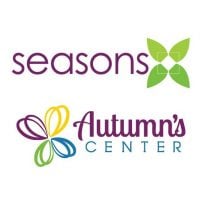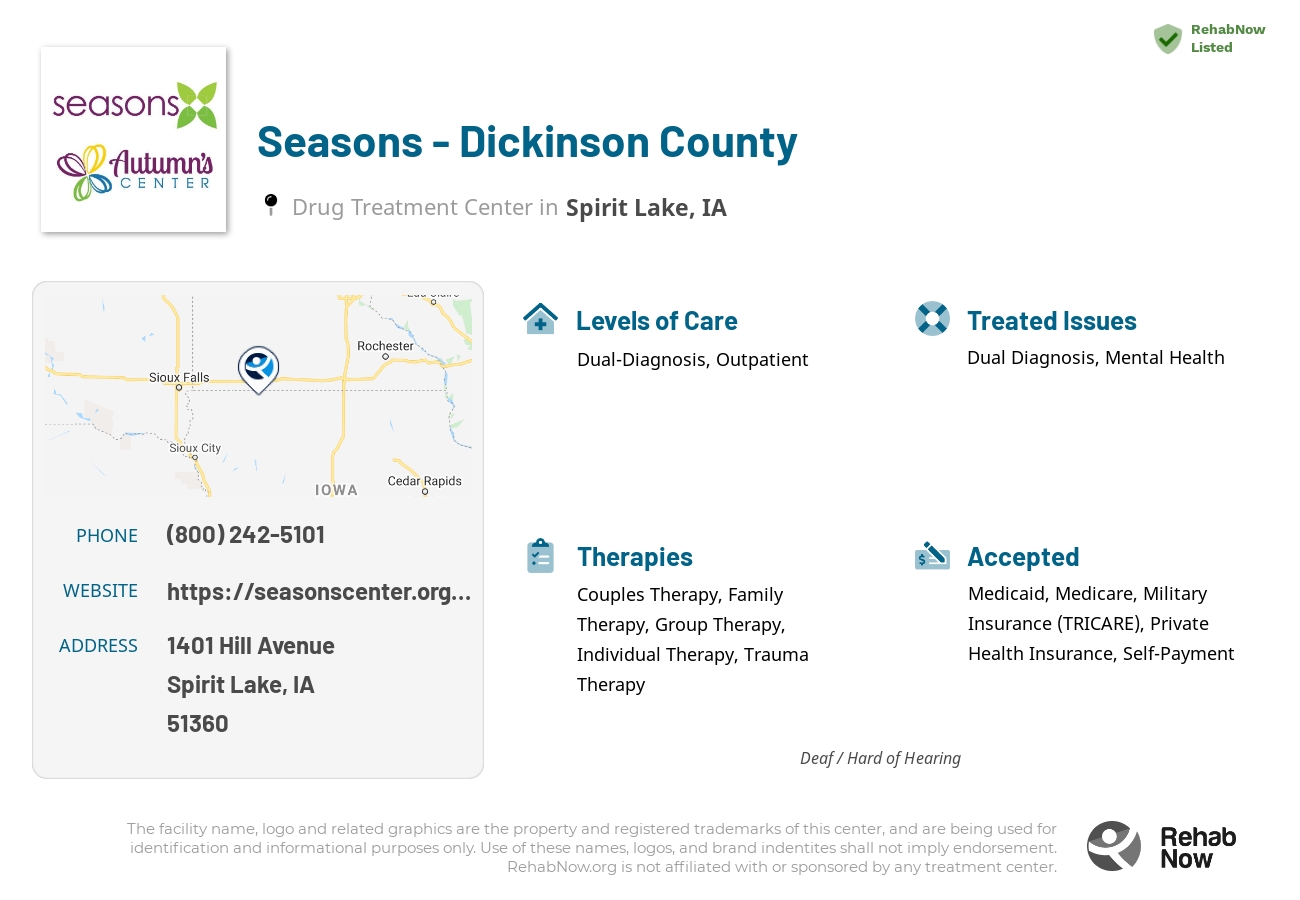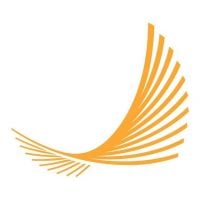Seasons - Dickinson County
Drug Rehab Center in Spirit Lake, Iowa
Seasons - Dickinson County is a premier addiction and substance abuse recovery center in Spirit Lake, Iowa, providing comprehensive treatment services aimed at improving the physical, mental, and spiritual well-being of individuals, with a team of dedicated professionals offering inpatient and outpatient treatments, as well as evidence-based and holistic therapies, helping clients to maintain sobriety and remain in recovery.
About
Seasons - Dickinson County is a premier addiction and substance abuse recovery center located in Spirit Lake, Iowa. It provides comprehensive treatment services for those suffering from addiction, aiming to improve the physical, mental, and spiritual well-being of every individual. The team consists of dedicated professionals from all walks of life, including counselors, therapy staff, and medical personnel. These specialists ensure that care is provided with safety and comfort in mind for patients and their families.
Seasons - Dickinson County offers inpatient and outpatient treatment programs, including individual and group counseling, cognitive behavioral therapy, and relapse prevention. They also provide evidence-based services such as medication-assisted treatment, detoxification services, aftercare planning, and family services. In addition, they provide holistic therapies such as yoga, art therapy, and mindfulness to help clients build resilience and self-awareness. Seasons - Dickinson County aims to treat the underlying causes of addiction, helping clients to maintain sobriety and remain in recovery for a lifetime.
Seasons - Dickinson County is accredited by CARF International, the nation's largest accreditation organization for addiction and behavioral healthcare services. They are also licensed by the Iowa Department of Human Services and have been honored with the Best of Awards from the Spirit Lake Chamber of Commerce. Additionally, they offer workshops, resources, and referral services to assist individuals and families during their recovery journey.
Genders
Ages
Modality
Additional
Conditions and Issues Treated
A person who struggles with addiction and a mental health condition suffers from a dual diagnosis. This means that they have two issues that must be treated. The specific mental health issues that the patient at Seasons - Dickinson County might have include but are not limited to:
- Depression
- Bipolar Disorder
- Anxiety
- PTSD (Post Traumatic Stress Disorder)
The specific addiction issues that the patient might have include but are not limited to:
- Alcoholism
- Drug Addiction (i.e., Cocaine, Meth, and other stimulants, Marijuana, and Ecstasy)
The combination of the two illnesses can be tough to treat. Taking care of one or the other is tough, and taking care of both cannot be done alone. A patient who receives dual diagnosis treatment will be given the best chance at becoming sober.
Levels of Care Offered
This center offers a variety of custom treatment tailored to individual recovery. Currently available are Dual-Diagnosis, Outpatient, with additional therapies available as listed below.
An outpatient treatment program is set up to help with alcohol or drug addiction or a co-occurring disorder. The treatment must attend the treatment facility for their therapy and other programs but return home each night. The frequency of mandatory attendance decreases after much of the treatment program is complete. The treatment programs are monitored by the treatment facility and case managers who work for a judge or judge’s office. A treatment program may be performed out of a treatment facility, treatment clinic, or treatment center.
The benefits of outpatient treatment programs are many. One of the most beneficial treatment programs is that it allows treatment for clients who cannot afford or may not be able to attend treatment at a treatment facility, treatment center, or treatment clinic full-time. Another benefit of treatment programs is that they reduce crime rates because treatment allows people to treat their addiction.
Therapies & Programs
Individualized Treatment is essential because it gives addicts the ability to participate in a program that meets their unique needs. An addict should work with professionals who understand what they’re going through, especially if the addict is actively using. Finding the right treatment program for an addict is difficult, but it’s even harder without communicating with those who have experience treating your specific situation.
Couples therapy is a treatment approach where the patients and their partners are engaged together. When a person becomes a victim of substance abuse, it affects the patient and his people, particularly his partner. Their relationship can become strained due to lack of communication, financial issues, loss of trust, lack of intimacy, and physical abuse in more severe cases. Couples therapy addresses these issues and tries to rebuild the trust between the partners. The partner’s involvement in the process will result in greater chances of treatment success and sustained recovery.
The therapies typically involve all family members, potentially including siblings, children, and parents who play a role in their daily lives. These sessions can be essential because they address past issues that may have affected an addict or alcoholic’s recovery process. They provide support during this time when it is needed most!
A family therapy session, often called a family meeting or intervention, is a necessary process that helps loved ones of addicts see their situation in a new light. It’s also one of the most challenging things families will ever have to do when they’re facing a loved one battling addiction or alcoholism.
Group therapy sessions provide recovering addicts with a chance to cope with everyday situations that many face. Group therapy sessions are held in rehab facilities, clinics, churches or community centers that offer drug addiction treatment.
People who attend these groups are encouraged to voice their feelings and support other addicts in recovery. This helps group members strengthen their own recovery program while cheering on others who are struggling with sobriety.
Trauma therapy allows them to work through past trauma to have peace of mind and begin down the road of sobriety. The therapist will work with the individual to help them understand their past and present relationships. Patients may often believe that something is inherently wrong with them or they are unworthy of love. The therapist aims to correct these negative feelings and behaviors by helping the person realize that their actions do not reflect who they truly are.
Cognitive Behavioral Therapy (CBT) is a highly effective treatment option based on the idea that how we feel, think and act all interact together. Our thoughts determine our feelings and behaviors; our feelings affect our thoughts, and our behaviors change our thoughts and feelings. CBT helps people explore their thoughts for problems (or false beliefs) that influence their mood and actions. By examining their thoughts and beliefs, people can recognize distorted or irrational and modify them to more realistic, positive ones. CBT is very goal-oriented, which means that the therapist and patient work together on a specific problem while learning to become more adept at solving future problems.
CBT works well with a broad range of people, including those with depression, anxiety disorders, eating disorders, and problems with anger. In addition to helping a client focus on thoughts that can be changed, CBT also allows them to take an active role in their treatment. This is called a collaborative approach because both patient and therapist work together to produce the best possible results.
CBT is based on cognitive learning theory, which says that our behavior is a learned response to our environment. Cognitive refers to thoughts and beliefs, while behavioral relates to actions or deeds. CBT helps people learn ways of behaving to improve their quality of life by focusing on specific problems or goals they want to achieve. Sometimes, CBT is used alone; other times, it is combined with medications or brief counseling techniques such as solution-focused and motivational interviewing to achieve optimal results for the patient.
Payment Options Accepted
For specific insurance or payment methods please contact us.
Is your insurance accepted?
Ask an expert, call (888) 674-0062
Seasons Associated Centers
Discover treatment facilities under the same provider.
- Seasons - Palo Alto County in Emmetsburg, IA
- Seasons - Clay County in Spencer, IA
- Seasons - Emmet County in Estherville, IA
- Seasons - O'Brien County in Sheldon, IA
- Seasons - Osceola County in Sibley, IA
Learn More About Seasons Centers
Additional Details
Specifics, location, and helpful extra information.
Spirit Lake, Iowa 51360 Phone Number(800) 242-5101 Meta DetailsUpdated November 25, 2023
Staff Verified
Patient Reviews
There are no reviews yet. Be the first one to write one.
Spirit Lake, Iowa Addiction Information
Iowa ranks 2nd lowest in the nation for illicit drug use, but 12% of its residents are still using these drugs every single year. Methamphetamines account for more than 90% of all drug-related prison admissions in Iowa. Alcohol is the most widely abused substance in the state, with 23% of residents admitting to heavy drinking.
Spirit Lake, Iowa has been hit hard by the opioid epidemic. Spirit Lake had the 9th highest rate of drug overdose deaths in the state in 2017. Drug addiction and abuse have a big impact on the community. It can lead to crime, homelessness, and job loss. There are a variety of treatment options available in Spirit Lake, Iowa. Some popular treatments include outpatient care, 12-step programs, and residential rehabilitation.
Treatment in Nearby Cities
- Forest City, IA (74.5 mi.)
- Vinton, IA (179.2 mi.)
- Dubuque, IA (233.4 mi.)
- Rockwell City, IA (75.1 mi.)
- Albia, IA (203.0 mi.)
Centers near Seasons - Dickinson County
The facility name, logo and brand are the property and registered trademarks of Seasons - Dickinson County, and are being used for identification and informational purposes only. Use of these names, logos and brands shall not imply endorsement. RehabNow.org is not affiliated with or sponsored by Seasons - Dickinson County.




